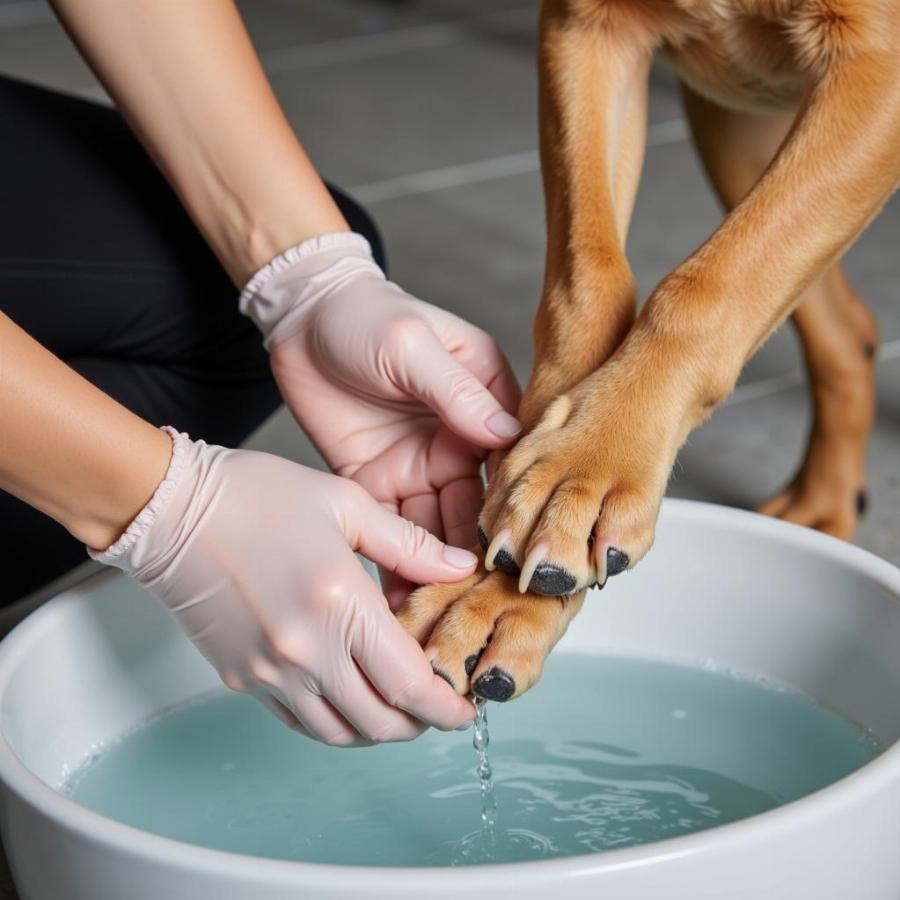Poison ivy in dogs is a common concern for pet owners, especially during warmer months when outdoor adventures are frequent. While dogs are generally less susceptible to poison ivy than humans, they can still experience an allergic reaction, leading to discomfort and skin irritation. Understanding the risks, symptoms, and treatment options for poison ivy in dogs is crucial for responsible pet ownership.
Recognizing Poison Ivy and Its Effects on Dogs
Poison ivy, scientifically known as Toxicodendron radicans, contains an oily resin called urushiol, the culprit behind the allergic reaction. While dogs’ fur offers some protection, exposed areas like the belly, groin, and paws are vulnerable. Dogs can also transfer urushiol to their owners through contact. If you suspect your dog has come into contact with poison ivy, it’s essential to act quickly. is pothos poisonous to dogs
Symptoms of Poison Ivy in Dogs
The most common symptom of poison ivy in dogs is itchy, red skin. This can manifest as raised bumps, blisters, or a rash. Your dog might excessively lick, bite, or scratch the affected area, potentially leading to secondary infections. In some cases, dogs might experience swelling of the face, muzzle, or paws. Though rare, severe reactions can cause difficulty breathing or lethargy.
Treating Poison Ivy in Dogs at Home
 Cách điều trị cây thuốc độc ở chó tại nhà
Cách điều trị cây thuốc độc ở chó tại nhà
If you believe your dog has been exposed to poison ivy, the first step is to thoroughly wash the affected area with lukewarm water and a mild pet-friendly soap. Wear gloves to protect yourself from urushiol. An oatmeal bath can soothe irritated skin. Cool compresses can also help reduce inflammation and itching. dermalone ointment for dogs
When to Seek Veterinary Care
While mild cases of poison ivy in dogs can often be managed at home, it’s crucial to seek veterinary attention if:
- Your dog is experiencing severe itching or discomfort.
- The rash spreads rapidly or shows signs of infection.
- Your dog exhibits signs of lethargy or difficulty breathing.
- Home remedies are ineffective.
Your veterinarian might prescribe antihistamines, corticosteroids, or topical ointments to alleviate symptoms and prevent secondary infections. poison ivy on a dog
Preventing Poison Ivy Exposure in Dogs
Prevention is the best approach. Learn to identify poison ivy and remove it from your yard. Keep your dog on a leash during walks in areas where poison ivy might be present. Regularly grooming your dog can also help remove urushiol from their fur. dog poison ivy pictures
Expert Insights
Dr. Emily Carter, a renowned veterinary dermatologist, advises, “While dogs are less sensitive to poison ivy than humans, prompt action is key to minimizing discomfort. Thorough washing and close monitoring are essential.”
Another expert, Dr. Michael Davis, adds, “Preventing exposure is the most effective way to protect your dog from poison ivy. Familiarize yourself with the plant and take precautions when venturing outdoors.”
Conclusion
Poison ivy in dogs, while manageable, requires vigilance and proactive measures. By understanding the symptoms, treatment options, and preventive strategies, you can ensure your furry friend remains safe and comfortable. Regularly checking your dog for signs of poison ivy, especially after outdoor adventures, is crucial for their well-being. Remember, prompt action is key in mitigating the effects of poison ivy in dogs.
FAQ
- Can dogs get poison ivy? Yes, although they are less susceptible than humans.
- What are the signs of poison ivy in dogs? Itching, redness, bumps, blisters, and excessive licking or scratching.
- How is poison ivy treated in dogs? Washing the affected area, oatmeal baths, cool compresses, and veterinary-prescribed medications.
- Can my dog give me poison ivy? Yes, urushiol can be transferred from your dog’s fur to your skin.
- How can I prevent my dog from getting poison ivy? Learn to identify and remove poison ivy from your yard, use a leash during walks, and groom your dog regularly.
- What should I do if my dog eats a poison ivy plant? Contact your veterinarian immediately.
- Is poison ivy dangerous for dogs? While usually not life-threatening, severe reactions can occur.
Beaut Dogs is your trusted source for comprehensive information on all aspects of dog ownership, from breed selection to specialized care. We’re passionate about providing valuable insights to the dog-loving community. For personalized support and detailed answers to your dog-related questions, please contact us via Email at [email protected]. Visit Beaut Dogs today to explore the wonderful world of dogs and discover how to care for them best!